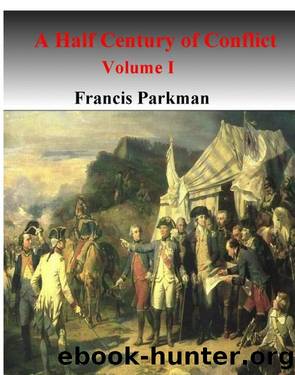A Half Century of Conflict, Volume I by Francis Parkman

Author:Francis Parkman [Parkman, Francis]
Language: eng
Format: epub
Published: 2014-11-09T16:00:00+00:00
CHAPTER IX â 1712â1749. LOUISBOURG AND ACADIA.
Peace of Utrecht. â Perilous Questions. â Louisbourg founded. â Annapolis attacked. â Position of the Acadians. â Weakness of the British Garrison. â Apathy of the Ministry. â French Intrigue. â Clerical Politicians. â The Oath of Allegiance. â Acadians refuse it: their Expulsion proposed; they take the Oath.
The great European war was drawing to an end, and with it the American war, which was but its echo. An avalanche of defeat and disaster had fallen upon the old age of Louis XIV., and France was burdened with an insupportable load of debt. The political changes in England came to her relief. Fifty years later, when the elder Pitt went out of office and Bute came in, France had cause to be grateful; for the peace of 1763 was far more favorable to her than it would have been under the imperious war minister. It was the same in 1712. The Whigs who had fallen from power would have wrung every advantage from France; the triumphant Tories were eager to close with her on any terms not so easy as to excite popular indignation. The result was the Treaty of Utrecht, which satisfied none of the allies of England, and gave to France conditions more favorable than she had herself proposed two years before. The fall of Godolphin and the disgrace of Marlborough were a godsend to her.
Yet in America Louis XIV. made important concessions. The Five Nations of the Iroquois were acknowledged to be British subjects; and this became in future the preposterous foundation for vast territorial claims of England. Hudson Bay, Newfoundland, and Acadia, âaccording to its ancient limits,â were also given over by France to her successful rival; though the King parted from Acadia with a reluctance shown by the great offers he made for permission to retain it. [185]
But while the Treaty of Utrecht seemed to yield so much, and yielded so much in fact, it staved off the settlement of questions absolutely necessary for future peace. The limits of Acadia, the boundary line between Canada and the British colonies, and the boundary between those colonies and the great western wilderness claimed by France, were all left unsettled, since the attempt to settle them would have rekindled the war. The peace left the embers of war still smouldering, sure, when the time should come, to burst into flame. The next thirty years were years of chronic, smothered war, disguised, but never quite at rest. The standing subjects of dispute were three, very different in importance. First, the question of Acadia: whether the treaty gave England a vast country, or only a strip of seacoast. Next, that of northern New England and the Abenaki Indians, many of whom French policy still left within the borders of Maine, and whom both powers claimed as subjects or allies. Last and greatest was the question whether France or England should hold the valleys of the Mississippi and the Great Lakes, and with them the virtual control of the continent.
Download
This site does not store any files on its server. We only index and link to content provided by other sites. Please contact the content providers to delete copyright contents if any and email us, we'll remove relevant links or contents immediately.
| Africa | Americas |
| Arctic & Antarctica | Asia |
| Australia & Oceania | Europe |
| Middle East | Russia |
| United States | World |
| Ancient Civilizations | Military |
| Historical Study & Educational Resources |
Magic and Divination in Early Islam by Emilie Savage-Smith;(1530)
Papillon by Henry Charrière(1408)
Bohemians, Bootleggers, Flappers, and Swells: The Best of Early Vanity Fair by Bohemians Bootleggers Flappers & Swells- The Best of Early Vanity Fair (epub)(1394)
Ambition and Desire: The Dangerous Life of Josephine Bonaparte by Kate Williams(1380)
Twelve Caesars by Mary Beard(1309)
Operation Vengeance: The Astonishing Aerial Ambush That Changed World War II by Dan Hampton(1155)
What Really Happened: The Death of Hitler by Robert J. Hutchinson(1152)
London in the Twentieth Century by Jerry White(1139)
The Japanese by Christopher Harding(1129)
Time of the Magicians by Wolfram Eilenberger(1118)
Twilight of the Gods by Ian W. Toll(1110)
Lenin: A Biography by Robert Service(1071)
The Devil You Know by Charles M. Blow(1018)
A Social History of the Media by Peter Burke & Peter Burke(966)
Freemasons for Dummies by Hodapp Christopher;(960)
Napolean Hill Collection by Napoleon Hill(936)
Henry III by David Carpenter;(915)
The Churchill Complex by Ian Buruma(904)
The Rise and Triumph of the Modern Self by Unknown(904)
